Steffan Piper's Blog
June 8, 2019
Jeopardy ... The End of One Era and The Beginning of Another ...
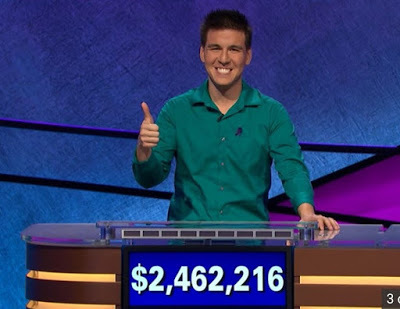
After probably 20 solid years of watching Jeopardy, as an adult and on my own volition, I'm going to retire my habit for the time being. I don't know how long I'll step away, but this is where I'm at with the show.
James Holzhauer's run of 32 winning games and his strategy was what myself and likely many others imagined for themselves if they ever got on the show. I talked about it for years, but never thought I'd live to see it happen. Start at the bottom, work up, find the daily doubles, wager half to two thirds of your bankroll and keep winning.
In 2014, Arthur Chu had a similar but different strategy and everybody hated him for it because he upset the sleepy-paced apple cart. I think most of us who take Jeopardy and Trivia seriously admired him. Chu is considered, publicly, Jeopardy's Most Hated Contestant. Just ... wow. Imagine that.
Some people didn't like James Holzhauer's approach either as it resembled a "buzz saw" (per Trebek) which chewed through unsuspecting contestants and made the game look one-sided. The problem with the criticism was that his knowledge bank was likely the best the show had seen in over a decade. The betting strategy was just a choice of gameplay. Being prepared on that level deserves nothing but admiration. He won because of his knowledge and buzzer skill. He made the money he did based on his wagering strategy.
As a side-note, because I'm a writer, by game 9, I had considered that he might have been cheating and that there was an elaborate system at play and we were all being duped. How could someone have that much knowledge, across a library of disciplines and recall it all that quickly. It felt too good to be true.
Obviously, this was absurd and a Dickensian fever dream of sorts, but it seemed plausible that someone from Vegas, who was connected to high-stakes gambling would be the kind of person to be out front pulling it off. Especially with that much money on the line nightly. 70k to 120k is quite the incentive to pull off a master hack / long con. But the hard truth was that he had a firm grasp of the knowledge and knew the realm in which Jeopardy's questions are centered and played strong. Running a perfect game before him sounded almost ludicrous, and people would not have believed it had they not seen it confirmed. James Holzhauer did it over 15 times.
Towards the end, it looked like Jeopardy was trying hard to unseat him. The questions by game 25 had gone outside of the usual realm of information / answers and the contestants we're increasingly 'data analysts', 'librarians', etc. and less of the usual run-of-the-mill players that show up hoping to get on. Fair play to Jeopardy if that was their interior, administrative strategy in dealing with Holzhauer. If not -- it sure looked that way to most long-time viewers whether they were ready to admit it or not. Some people are still arguing against this notion online, but the question is, if it didn't occur as it appeared, why are you pushing back so hard to avoid analyzing what was seen? Yes, we all know the setup and game rules and how they run the show. That's common knowledge. Zero points for stating the obvious. I doubt we'll ever know because it would take a Jeopardy Executive beIN interviewed about how they reacted to having someone like James Holzhauer.
I also DON'T believe the common refrain about Jeopardy contestants all being the 'best of the best.'
Yes, there is a list of the best active trivia players on that circuit. Yes, they do have it and know who's who, but there isn't enough living specialists to provide 3 per night for 9 months straight, year after year.
Example: I did the online try out and killed it. They literally called me on the regular to come in and join the contestants pool in the audience. I'd never do well on TV as theory vs. reality is an entirely different matter, plus I have facial / body dysmorphia, so seeing myself on TV would just be too painful to watch. I'd never go live.
This illustrates my point that not all these people are top tier, nor need to be in order to get on. Some people just have a dream and decide to show up. If they are lucky enough to go through the randomized lottery, which Jeopardy says occurs, then they've gotten to the mountaintop and are ecstatic. Fair play and we'll done.
But as a side point to consider, a friend of mine pointed out that the NBA suffers the same fate with having so many great players spread out over so many teams. Even with as much interest, finding truly remarkable players is difficult.
Some people complained that Holzhauer broke Jeopardy with his game play. On some level they're right. He exposed the show's weaknesses and illustrated what can happen when you get past your innate fear of losing and practice real risk, especially with money. He gave the public a master class in business leadership that no one was expecting. This can't be stated enough.
Alex Trebek was once asked what he didn't like about the game and he stated that he "found it frustrating when contestants didn't wager enough or understand how to bet. They had nothing to lose and everything to gain." This ignorance of wagering is seated in fear and the show's truly most frustrating aspect.
The game isn't broken, it just got finally played to completion. It was like everybody before him made it to the Boss Level, including Jennings, who grinded out 74 games and stopped just short. But Holzhauer, like the character Parzival / Wade Watts in the film 'Ready Player One,' who got to the end, forcing a reboot and reconsideration of the whole system. When this happens, most players get up, stretch, enjoy the feeling of completion ... and move to something else. The challenge has been met and bested.
So what's going to happen next season? Will more players like James show up to play and practice the same strategy? That's likely a real concern for the show. The show show will cost the network much more money to keep on the air if so without any guaranteed ratings to boost ad revenue. Will they make a few rule adjustments going forward? Will they cap the number of games a person can play consecutively?
I tried watching a few nights back but it looks like a bunch of headlight-struck tourists showing up as also-rans, which just feels goofy. That was my experience.
Maybe you felt something similar or even opposite.
Final Note / Edit:
Because people might read this far and wide and not have the context of knowing me in real life, let me state that I love Jeopardy and everything about it. I love what James Holzhauer has brought to the game and his high-level of performance and competitiveness. He should be celebrated. I very much enjoyed and rooted for Arthur Chu. To date, if I had to rank my favourite players, obviously James takes first as we've all witnessed what happened. Julia Collins and Austin Rogers tie for a close 2nd place. Much respect to the other players as they are all magnificent in their own right, including Watson.
Steffan Piper (6.8.2019)
Published on June 08, 2019 13:27
March 19, 2019
What a good book should do for you ...

"I think we ought to read only the kind of books that wound or stab us. If the book we're reading doesn't wake us up with a blow to the head, what are we reading for? We need books that affect us like a disaster, that grieve us deeply, like the death of someone we loved more than ourselves, like being banished into forests far from everyone, like a suicide. A book must be the axe for the frozen sea within us." -- Kafka
Some books must be an axe, but sadly, many are not. I would wager in fact, that the majority of books are actually more ice for the frozen sea inside the reader instead.
As someone fascinated by Charles Dickens, and was so long before the current resurgence that we're currently in due to his 210th birthday, books like Oliver Twist, Great Expectations, David Copperfield and Hard Times were like the axes against my frozen soul. For the last decade, I have read Oliver Twist every winter, taking time to read some of the essays, prefaces and criticism by Dickens and others during the process. There was a lot of meat and cold steel in those pages that made me come to terms with my own struggles of who I am as a person, and what I was to be.
However, in my opinion, a lot of readers would rather not look inside and break apart that construct of the complex fantasy that protects them. More fantasy is often the medicine they self-prescribe. I'm not speaking of the kind of fantasy written by the likes of H.G. Wells, R.A. Salvatore, Connie Willis and the like. No. I meant readers will purposefully steer themselves away from specific material that they know will bother them. Effect them. Penetrate deep down. Break upon the frozen sea inside of them, like an axe. They know this almost at a genetic level. Hence the difficulty of Literary Fiction. It's a set-up to knock down bowling pins and the reader knows it.
On the obverse side of the same coin, not to be flip, but I also spent years trying to freeze whatever it was within me, and I purposely tossed huge bricks inward to help the process. When I was 12, I discovered an author by the name of Carlos Castaneda. I started reading him casually, semi-interested in his journeyman's travels into Sonora, Mexico as an Anthropologist. By the time I was 15, I had read most of the Castaneda books three or four times, back to back. Some say the first three are the most important. Some say the first four, while others say the first seven are gospel. It's a personal choice, really. Journey to Ixtlan, though, is likely most critical.
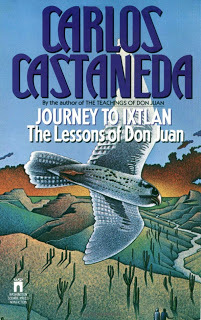
What Carlos Castaneda did though, at least with my ever-growing perception, was the idea of letting go of self-image and stepping away from the development of self-image in a committed fashion, as well as stepping away from what we think the definition of the world and this life actually is. His world-view and stand-point was similar to that of some ancient Hopi Natives, or the Yaqui Natives that he wrote about, who gazed into crystals seemingly to discover that this world was merely a veil, disguising a much larger, expansive one.
The young mind typically eats that stuff up. No surprise there. While everyone else was sprinting to the grocery store for Stephen King, I was on my way to the library, or some god forsaken place that sold “new-age” books. Heady stuff for a kid -- but I was never a kid. Not really. At least, I didn't feel that way, if I was. I did my best to break this free, like loose chunks of ice, in my novel Greyhound , but while most readers loved and adored it, some had a hard time accepting that children are that complex.
Note: The Yaqui Natives did this 'seeing' without the use of crystals, just for the record, and it was a practiced ability with a great significance to them, according to Castaneda. I had to include this before someone cried foul.
There's an interesting scene at the beginning of the film Blade Runner, where the character Holden is interviewing a fugitive Replicant named Leon, and when asked about the psychological test in process, Holden issues forth this immortal line:
“It's a test designed to provoke an emotional response.”
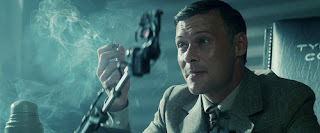
To me, that's what I believe Kafka was alluding to. As much as he was trying to break worthwhile ground with his readers, he knew that a lot of people would ultimately reject his message and the message of other equally important classics. Hence, the reason why they're likely referred to as 'the classics'.
When you read a book, you may not like it. The real point is to what degree? Did you hate it, despise it, loathe it? If so, then you have a winner on your hands, because it made you think and feel. Not all books are supposed to have happy endings or feel-good story-lines or even deliver perfect closure.
Why?
Because that doesn't happen in real life. Real life is dark and messy and full of heartbreak and loss. Dealing with those issues is the real story. Learning how to cope and thrive in any otherwise uncompromising environment, is likely to be the most valuable lessons you can glean from the pages of any good book, in any genre. Life is a test, designed to provoke an emotional response, as should our reading.
I'm often perplexed when I read negative reviews and I read things like:
“God, I hated all those characters in that book. They made me feel icky and sad. 1 Star!”
Those things honestly perplex me, as it's clear that some people are smart enough to read, but still need assistance in thinking critically and getting off the surface of their own visible earth. It made the person feel and feel strongly, and yet the book failed? No, sorry. Look again. Inward this time.
But here's the whopper to the whole thing … as I go through my everyday life, and do my repetitive tasks and drink my morning coffee in a daze, I know that it's unlikely that I will probably come face to face that day with someone like Bill Sykes, Fagin, young David Copperfield or Miss Havisham.
Estella? Sure, all day long. Beauty is everywhere.
But people that make you feel intensely? The entire spectrum of emotion? They're like books – we do our best to avoid them. Most of us 'loathe confrontation' or 'don't waste time with low-class people' or 'don't care to waste time with people like that when I can go make $25 an hour at work.' The reasons are endless, but the truth is as obvious and plain as the money in our pocket.
Next time you're buying books, please think of me. Are you going to grab your easy-to-read, bare-chested Romance, or would you be willing to pick up something a tad more challenging – like an axe – and hack inward?
You might be surprised at what you discover. People are like huge blocks of marble, and it's only when you hack away at it, do you discover the real them, the real art, the real beauty on the inside – not the shallow glossy surface that we're first presented with.
(Original Post from 2008 - Reposted because of relevance.)
Published on March 19, 2019 13:36
January 7, 2019
This is what happens when you obsess and make bad decisions ...
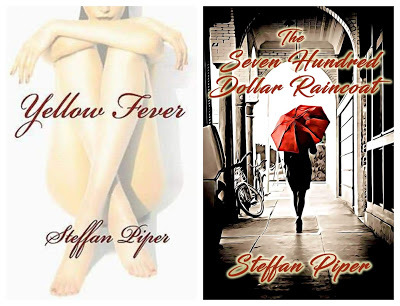
I should probably begin with an apology. Whatever decisions were made and whatever paths that opened before me, or doors that slammed shut, all of it rests solely with me and I blame no one for what's happened – but me. I am sorry about the whole damn business.
When I first wrote Yellow Feverand worked away for months on several different drafts, it was the summer of 2004. Like every writer toiling away, I was elated at having completed a new book. Especially one that was about events that had wrapped up my life for a handful of years in a very awkward and difficult way. Those were the kind of experiences that most published writers tell people who are young and wondering what to write about to chase down and flesh out. When I was working on it everyday, I was convinced it would become some New York Times Bestseller and land me squarely on the map as a young new writer. I imagined I would be seen to be wise beyond my years, having lived both fully and intensely and naturally be something publishers would jump at and shower money on.
Except none of that happened. Not even close. How wrong I was. I was probably five or ten years too late to the writing game to make any impact with a story like what's in those pages. I queried both agents and publishers religiously. I had a checklist of the letters that went out and those who responded. I now keep those letters in a box in my garage as I'm inclined to believe that most publishers no longer send physical snail-mail rejections to anyone. I'm guessing the only mail they send out these days are just the obligatory signed copy of a contract and possibly a check. Even that now seems like a stretch by today's standards.
Most young writers don't understand that finishing a novel is just a small portion on the road to being published. One that may never materialize. I thought for sure that destiny and me would meet up at the Publisher's office one day, so I foolishly trudged forward.
This book has had many, many versions since it first birthed. But, after two years of no one wanting to publish it, I felt like giving up. I was told it was a beautiful story that was well-written and that I should submit it to writing contests in order to get recognition. It was good advice back then, but I didn't follow it. I just kept editing the book, making it cleaner, tighter, smoother. I was obsessed with it and likely in a very unhealthy way. I should've moved on to something new, but I kept on with it, not wanting to believe I'd had to shelve it. It was a crossroads and not a good one.
So, desperate and looking for anything, I decided to attend the San Francisco Writer's Conference that year and try to pitch the book to an Agent and get picked up. I practiced the pitch, but I fumbled it when having to deliver the lines cleanly. I struck out at every table I pitched at. It was humiliating and I was at an all time low. On a side not, on the first day of the conference, I had entered my email and novel synopsis into a raffle with a company called iUniverse for a free publishing package worth $1500. At the time they were seen as the slickest and most-together Print-on-Demand publisher going. They didn't have the baggage of the old vanity presses and they were seen as an up-and-coming tech company that could do well in Publishing if they grew in the right direction. They were the first company promoting eBooks – even before the Amazon Kindle device and their gold-mine delivery system of eBooks. At the time there was no way for customers to readily purchase and download eBooks on a large scale direct platform. A lot of people were interested in what they were doing.
Needless to say, I won the $1500 raffle. They contacted me and said they would publish my book and I wouldn't have to pay a dime to them and they would even market it. I was skeptical, but that was the golden egg right there. Free marketing. Back then I was too green and grateful to know that free or not, it was still a ruse and the company would end up being seen as another predatory print-on-demand business, but that revelation was still a year or more away. I had nothing to lose and was happy for the attention. These days Wikipedia says that only 50 or so writers ever made money with them. Even though I've never seen a royalty check, I'm guessing I was one of the authors as I can easily track the sales data through my Amazon author account. Yeah. Imagine that. To this day, they're still distributing the material even though I've formally asked them to stop. Back then. they were marketing a book by the 'Long Island Lolita' Amy Fisher and it was selling well. Anyone could've easily been fooled by what they were offering.
Towards the end of the San Francisco trip, I had ended drinking so much up in North Beach, my wife was absolutely livid with me and told me I was going in the wrong direction with all my plans and dreams of being a writer. She was displeased with me and I knew I needed to find someway to turn it around and start going in the right direction, so I started writing a new book while iUniverse was doing their thing with Yellow Fever. To their credit, they even did a light edit and spoke to me about the problematic nature of the title.
I explained to them that it wasn't what they thought. It was actually about how there's this nettle plant that if you get stuck with, it makes you ill for months and most doctors will mis-diagnose you with Malaria or Yellow Fever as they call it. The antidote was a type of root that was the only cure. Ironically, the main female protagonist had the same name as this poison. Imagine my surprise when I kept researching it and learned that the antidote had the same surname as the main male character? It was too much of a coincidence and so I wrote it into the the middle of the book, which was well-placed and everyone who read it, found it executed wonderfully. There's even a few reviews that thankfully cover it better than I can.
That's what it was about. Not the other definition, even if it seemed like it was. That was an intentional red-herring. To me it was poetry and I wasn't going to be talked down from my lofty, and ultimately idiotic place of blue-sky day dreaming. Looking back, some of my book titles have been my undoing. That one was no exception.
Fast forward a bit, and Greyhoundwas released by Amazon Publishing. I don't need to go into any detail here about that book or them. I've spoken at length on it already. After Greyhound came out and did well, Amazon asked me for another novel and after several months, they had been phone-calling me asking what I had ready, and what I was working on. I had Waiting for Andre mostly finished and stuffed into a drawer, but I wasn't ready to let them have that particular book. I honestly thought they weren't organized enough and would fuck it up and not publicize the book like it needed. You have to remember, Greyhound was chugging along on the Best-Seller list, but because my publicist through Amazon had absolutely no experience doing that job and no savvy marketing my name – I ended up not ever sitting down for a single interview. Not even a school newspaper. Hence my fear of giving another book to them that I had slaved away at and believed in. It felt like a losing prospect. Only a great fool would've dove in head first. Several of the other Apub authors had reached out to me quietly and shared their same concerns about the fledgling publisher and were trying to make the best of it. A few were already regretting it and trying to find their way out the back door.
For my second novel, I very quickly wrote Fugue State and they gave it a greenlight. That was a decision that likely ended my relationship with them even though I was blind at the time to see it. They wanted a close follow up to Greyhound. A like-minded companion which was an easy sell. A David Copperfield to my Oliver Twist. I didn't give them that. I gave them my On The Road instead. I didn't have a mentor at the time, so obviously I was going to eventually bungle it.
Around this time, I had a spark of genius, which I might now call a brain fever. I thought I could pitch APub my other novel which had received little traction, but had a handful of wonderful reviews and was selling well all by itself. I calculated that they had the legal muscle required to pull the book away from iUniverse, go through a heavy editing and release it as the next book in the story line. Part B of my ridiculous fever dream was that I would hire the editor Amazon had given me to edit Yellow Fever and turn it into a better more marketable story that they would have a hard time passing on. To me, it sounded foolproof … in my head.
As you can probably tell, this was ultimately a very bad idea. I threw thousands of my royalty dollars at this project. And through no fault of the editor, the book ended up an absolute mess. He hated the story and the title, hated that it was in first-person, hated that the character had the same name as the author. (Yes, I had done that), and in order to change all those things and make the title still work (remember the poison / antidote idea?) we would need to rework large sections, add a few new chapters and edit every tense usage imaginable.
Now, I've written before about how typos are the gremlins of any writer's life. My situation is no different. I seem to be absolutely cursed by them. I would go through several chapters at a time, fixing mistakes, rewriting sections and cleaning the material up, only to come back weeks later and discover that nothing had stuck and all the errors were still there and now were even more truncated and exploded. My sneaking thoughts were that someone was actually going into my material and physically changing things just to fuck with me and cause me grief. Not prone to paranoia though, I paid it little mind and just kept re-editing. However, it was getting harder each time, because no matter how good a story is, one can only re-read a book so many times. Especially in such a short period of time, too. I was blind to the short-comings in the book, I was blind to the typos and I was blind to my own foolishness that I should've never embraced to begin with.
So, after a long five months of daily work turning Yellow Fever into The Seven Hundred Dollar Raincoat, which was now a metaphor for the female protagonists psychological drama and reaction to her chosen career path, I thought I had a real winner on my hands. I thought, wrongly, that the manuscript was damn near perfect, error free and an easy read. Again – how wrong I was. It was an absolute mess and I was completely un-fucking-aware of the reality of it. My personal perspective on the book in those months is equatable to being absolutely bonkers. This is why Stephen King's advice about walking away from a manuscript for a few months before sending it out is good advice. Again, I didn't adhere to that line either.
So, I submitted it to Amazon Publishing thinking they would love it. I patiently waited to hear back and went about my business.
I'm sure they must've thought I had gone mad. They probably thought I had taken up smoking crack or some other illegal substance because surely, this couldn't be the same bloke who gave us Greyhound or the marginal, military road novel Fugue State. Embarrassed by me, I'm sure, they passed and tried to be polite about it. Not being a confrontational person, I accepted their rejection and fell down a slope of depression that kept me away from writing anything new for almost three years. Yes, I compounded one stupid decision with another. I gave up. I had my hands-full raising my son at the time, which required everything I had, so I happily shut down my creative mind and disappeared into being a parent. It felt like the most natural thing to do and likely the best move for self-preservation. I fully walked away.
About a year later, in the middle of the night, without even looking at the document, I quickly turned the manuscript into an eBook and released The Seven Hundred Dollar Raincoat on KDP for 99 cents and then vanished once more. It got three reviews. Two of them detailed the editing mess that had overtaken the book, of which I had no interest in addressing or wondering what the problems were. One person wanted their dollar back. I actually mailed them a single dollar in a birthday card that cost me $2.99 at Walgreens and then about a dollar to ship through the mail. They left a comment about it on their review thanking me for being true to my word. I should've never released the eBook. That's the real moral of the story here. For all these transgressions and piss poor calculations, once more, I apologize. Fully. I let down my readers and squandered whatever marketable interest my previous publisher had in me. It was all my doing. I'm adult enough to know when to fess up, what to own and what is relevant and important in retelling you now, after-the-fact.
You may be wondering why after reading this article I would be so candid. The point is that character is about what you do when no one is looking. Trust me, no one is looking. I'm coming clean about Yellow Fever / Seven Hundred Dollar Raincoat as a full disclosure and doing so at a time when my writing career sits in a very dark closet and no one knows me from Adam. My ego and my intuition still tell me that I have yet another chapter to go in my career and one day, people might wonder just what the hell all that was really about. I may have a stroke and completely forget about all this nonsense. I might even pass away and thirty or so years will tick by before some bright spark makes a film out of one of my books and I receive some modest level of praise or footnote of barest mention. The point is, I still believe I have a story to convey to the reader and that the reader is still interested. The publishers today might not know what to the hell to do with me, but that's just the nature of the game, isn't it? These things will eventually work themselves out. My job is to be candid about my journey and my life and above all, to keep writing novels that confound, inspire, shock and delight readers of all ages and through multiple genres. Anything less is a waste of both your time and mine.
Re-reading this material and giving the book another real and effective edit has brought a lot of this to light and was necessary food for thought. I will re-release this title when it's ready. But not before. I promise.
Who knows, one day some poor soul might have to read this for a literature class. All I can say is I feel sorry for ya mate. Everything you ever needed to know about me or any of my books can be figured out in the pages themselves.
Published on January 07, 2019 11:55
December 9, 2018
And that's a hard pass ...
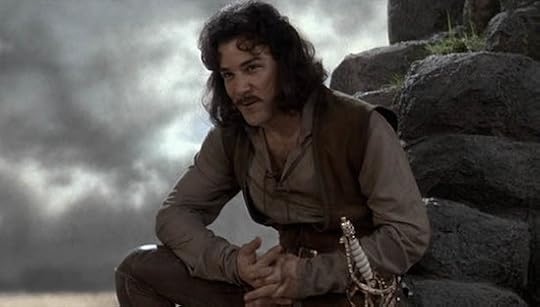
I've been in the writing business so long, now that it's over ... I don't know what to do.
Weathering rejection is never easy. People talk a lot of getting up and continuing, but it's not the easiest thing to do when you've lost ground and have very little place to stand. Every board in game is only comprised of so many spaces.
Published on December 09, 2018 14:47
November 27, 2018
Home Owner's Associations ... Being a Director, and finally knowing when to walkaway ...

For the last four years of my life, I've been involved as a Director in my community in North Indio. Tonight, was my last official night of business. They held an election, I wasn't on the ballot, but I was anxiously awaiting the results like other homeowners, hoping they would make the minimum number of votes received, or quorum, so the election could be ratified – and I could be officially relieved of duty.
I know that doesn't sound like what you'd expect to hear, but after having served for almost four years, I felt as if I had volunteered enough of my free time, handled enough late night phone calls, politely answered my door to hear out angry neighbors and bear the brunt of someone's ire on social media or at social gatherings. I've been threatened more times than I've been thanked, but the threats were always hollow and the the thanks were always heartfelt and even at times tearful. I negotiated the best I could for all homeowners with other Directors and Legal Counsel, but always held to the letter of the law in all matters and sought advice from those I served with.
HOA Directors are bound by the Davis-Sterling Act to preform their fiduciary duty and protect the assets and property values of the community, to make no decision that would negatively impact the community insurance policy and make decisions that have undergone due diligence and well considered. The largest part of any Director's responsibilities is to uphold the communities Covenants, Codes & Restrictions, it's Bi-laws and its basic Rules and Regulations. These vary from place to place and can be the source of most of the drama and political fallout. Directors cannot be paid, nor be involved in any form of self-dealing or make decisions that would benefit their friends or family directly. It's pretty straight forward. Some people get this, some don't. It's not uncommon, but most of the time Directors who volunteer to serve on these types of boards, do so in good faith with the sole intent of serving the community honestly … and as always … some only come to serve themselves. Most of the time it's quickly obvious, but sometimes it isn't.
That said, HOA's are usually hated or reviled by most people and often misunderstood in their purpose. It's not easy living under someone else's set of rules, especially as a full grown adult.
I've always said to homeowners that “Everyone always loves living in an HOA until they get a ticket for a rule infraction, or they do something they don't have permission to do on their property. Then – the HOA is the bad guy. Count on it.”
They're hated by people who live inside of their gates and who just cannot abide by very simple and very basic rules. Don't park on the street without a pass between midnight and six am, don't leave your trash cans on the curb for days on end, make sure you keep your front yard looking decent and your plants and grass watered. And above all – shockingly – pay your monthly assessment that covers whatever amenities your community has, which includes the perks of landscaping security, financial stability, management and so forth. You know whatever that amount is when you buy the place, whatever it is, be it $69 or $269. You even sign a document stating this in your escrow packet. Some communities have monthly HOA dues up around $800. Those developments however, cater to a different subset of people and those owners are treated more like customers at a five star hotel rather than just everyday mortgage payers. And understandably so. This is America, after all. You get what you pay for in the land of silk and money.
Living by basic rules is easy for most people who are just happy to get on with their lives and business, carry on even-keeled and be kind to all adjacent neighbors, which isn't that difficult. Most of us do this without thinking. It's like breathing, or doing laps in the pool and keeping your heart rate at a steady pace the whole way from wall to wall. It's really not hard. Some people, however, make it their life's work to look for fault and unhappiness as if there's a reward for it. These are the people you often read about in news articles about HOA disputes. These are the folks that will push a simple issue all the way in front of a judge or into mediation and often with little to nothing more than a perceived slight, bruised ego or an inability to accept a basic limit. And of course, sometimes this happens because that person is litigious and knows how to take advantage of an Associations weakness.
HOA's are also loathed by people who have never lived in an HOA and who don't grasp their benefit, regardless of how much they read on the subject. To truly understand HOA's and appreciate them, you have to live in one, and even moreso – serve on the Board of one. It's not to find out personal or financial business on your neighbors, but you do get a good example about how most of them will conduct themselves professionally. From retired CEO's to struggling janitors.
In 2014, I bought a beautiful home in the gated community Terra Lago in North Indio. The house sits on a quiet corner, has a large Palo Verde tree in the center of the large green grass yard and an abundance of bougainvilleas climbing up brick walls. There's multi-colored red, white and purple vinca flowers, little square green hedges, lavender bushes, iceberg roses and a long row of oleander trees that look like they've been hand-curated by Mr. Miyagi from the Karate Kid. I grew them from small plants in my kitchen over a year and then transferred them carefully outside. As a retired Marine who has seen combat, one of the best practices I've ever engaged in is gardening. The old saying 'It's better to be a warrior in the garden, than a gardener at war' has always rung true, especially for me.

The sun shines in Indio most days, the weather stays in the eighties almost year round and it's pleasant, quiet and all-around serene. Kids ride bikes and laugh in the park behind my house. Lino, the Ice Cream Man stops by every few days at my corner and says hello. We catch up on how our kids are doing in school and I do my best trying to speak Spanish to his dad, who is a true gentleman and does his best to make me laugh. In the summer, when it gets up around 115, people either stay inside or sit around their pools, sipping cold drinks watching the kids play and listening to music, podcasts or reading their books. It's almost idyllic. Even as an author who lives on modest means, my house has the refinements and happiness of someplace much more lavish.
Most people will tell you that there is no such place as “North Indio,” by the way and there's only Indio, and they would be correct. But in 2006, when development in Southern California was going at mach speed, large swaths of land north of the I-10 freeway, east of Palm Springs became developed at an unsustainable rate. All of this area was known, or informally referred to as North Indio, and the name stuck. When the market crashed, a lot of these homes became foreclosures. Many had just been built and never lived in. Builders had been financed to construct these homes with the money from out of town investors, mostly from Anaheim, San Diego and as far away as Canada. Some of the houses, like mine, were purchased in groups of eight, ten and fourteen. But, by the close of 2007, it didn't pan out that way. Not even close.
Lots of people lost everything during the crash and it was painful. I witnessed friends lose their savings, their 401ks, their new houses but mostly their good will towards others and the country slowly changed for the worse. People took just as much of a hit to their pride as they did their pocketbook. They felt lied to and betrayed. They blamed the Realtor's who sold them the houses and then the banks. Few took the blame shoulder first, acknowledging they had invested poorly, or spent beyond their means. Many today still speak about 2007 like there wasn't a soul alive that saw the crash coming, but we all know that just isn't true. Afterwards, the country, Coachella Valley included, spent many, many years of hard work climbing out of that hole. 'Toxic Assets' as they were then called from Wells Fargo and others, sat in North Indio communities for many years to come. The last toxic asset property in Terra Lago didn't sell until 2016. We celebrated when it sold at my house, not because I was on the board, but because it was directly beside me. The neighborhood kids played in the backyard for years and it had sat vacant for so long, they thought it was a haunted house.
I purchased my home for a steal at the tail-end of the economic market crash in 2014 for the all-time low of roughly $230K. We closed escrow on Saint Patrick's Day, and for an Irish kid like me, it was a good omen. I don't mention this to brag, because in California it's not a boast by any stretch of the imagination, but for 2700 sq feet, it was a steal. Now, you would be hard-pressed to build a house that big for $200k in California. But when I was interested in purchasing, my Realtor and other Realtor friends in Palm Desert, laughed at me and thought I had gone mad.
“North Indio? Are you crazy? That's gangland over there. Wild West, bud. Those communities are never going to get any better!” It sounded troubling.
My first Realtor refused to show me any homes in the community I had inquired about. He stated “You do know there's a Board Recall in that place, right? Homeowners' got together and raised about $20K to pay the legal costs to have that board removed. The Sheriff's were called and it was ugly. Nobody wants to buy in there and almost everyone wants to sell. Of all the places to live – that aint it.”
This was my introduction to where I live, my new HOA, and my neighbors. Terra Lago had the worst reputation of any community in North Indio and the Directors at the time were infamous and known valley-wide and talked about as if they were a pariah or mythical. And it got worse. The City of Indio considered the homeowners in my community a nuisance and wanted no part of any personal or written contact if it wasn't necessary. Homeowners had picketed out in front Indio City Hall on the sidewalk, mad about Mello Roos and it hit the evening news. This was a situation they couldn't fathom and it was at a breaking point.
For me, I'd lived in Santa Monica, Brentwood, Burbank and Hollywood and the City Fathers of those places had huge public outreach to make sure everyone was happy. Sometimes it wasn't, like during the O.J. Simpson trial for instance, but those times never lasted. In L.A., community meetings were always what they were supposed to be and the meaning of community was always stressed. Neighbors were the glue that held those places together. Of course there was always enough NIMBY threats to keep everyone together and hunkered down. But this wasn't the case here. This was like moving into a no man's land. When you have a community of all brand new neighbors, and they've come from all over the country. It would be foolish to believe that you would find a sense of community right off the bat, and it was true. It would take time. A lot of time.
When I eventually met my neighbors and spent weekends relaxing near a bar-b-que or the pool, the conversation would always turn to whatever the recalled Directors had engaged in or were still up to. Most of them were still active in the community, had even re-run for the board after being recalled and still maintained every shred of innocence they could muster in their own defense. And that's not out of the ordinary either. People still had to live here and be neighbors.
“What the hell happened that people had to have these guys recalled?” I asked my new neighbor.
The tone would always change with every person I asked and the story was always the same. That one person had their cars towed out of their driveway overnight, with no warning whatsoever while they were sleeping. That another person was cited and fined $2500 for having a metal salamander climbing up their brick wall on the front of their house. That one homeowner wasn't allowed to build an entry wall for his courtyard, but his neighbor three doors down who was best friends with the Board President was given permission. That one homeowner was taken to court, their house was liened and then foreclosed upon and they barred from entry for past fines which were all for landscaping violations. Another neighbor was actively being stalked by one of the Directors and it was getting worse over time.
“Come again?” was my usual response.
I was knocked back almost every single time I heard these stories and shown either the tickets, the letters or receipts of their financial impact. I couldn't figure out if it was that some people were bored and had too much time on their hands, or that they couldn't help themselves with even the most rudimentary amount of power. Feeling obligated to ticket every infraction from the most minor through the most egregious, and filtered through their interpretation of the governing documents didn't make it right. Even on the outside of the situation, these actions didn't add up.
Most of what I heard I couldn't believe, so I spent one full year talking to as many of the 523 homeowners who had been involved as I could. I started slowly and I eventually made my way through the bulk of anyone who knew anything. Being a writer, I was curious. I wanted to hear these stories directly from the mouths of the affected as well as the perpetrators no matter what was said, and of course I kept very detailed notes. It was a mixed bag of backgrounds from retired CEO's to single mom's working as school teachers for Desert Sand Unified, and the reception was as any might imagine. Almost textbook. Those that had been negatively affected or harshly treated were happy to talk to someone and tell their story. They felt betrayed or unfairly harassed. They often told their stories through tears and felt what was being done to them, wasn't being distributed equally to all people who were in clear violation, or if they were violating, others were never ticketed or bothered at all. Many had moved to the desert from colder climates to enjoy the good weather and regain vitality and better health and live in peace and that was never to be had or found after their run-ins with the HOA.
Those that were involved in any way as a perpetrator or in support of the perpetrators were hostile, overbearing, judgmental and on many levels dishonest, snide and overly suspicious. Often times it came down to just too much box wine and too little compassion. They were literally hunkered down into a small group trying to defend their actions and the actions of others. Most of those meetings were unpleasant and I used every fibre of my being to be open-minded and friendly. Sadly, the facts just didn't fit some of the stories they wanted to tell and playing the victim was almost prescribed by everyone in their circle.
Part of the problem is that when you move into an HOA you never expect your neighbors to use their positions of power to make life difficult for the people around them. Most of the court cases that have come to national attention have been exactly that. One case was a homeowner who wanted to install a flagpole on their property and were told 'No' by their Board. Being able to fly and display the US Flag is a federally protected right, and no HOA law, rule or guideline can ever be out of sync or seek to supersede County, State and Federal code or law. That is the first basic step. However, in the past. Board members erroneously thought they could impose their will on other owners, as long as they got away with it. But that changed with every new challenge and every setback. Now the courts have established these arguments and will no longer hear these disputes further.
On one level though, I could understand the plight of the perpetrators however. They weren't being evil as they saw it, they were just wanting to stand their ground. It was quite simple and their stories were also very similar to each other.
They had moved in from out of the area, usually from colder climates like Detroit, Canada, Seattle, the midwest. They had been courted to buy their home either by a Realtor or a Builder and informed that it was an upscale 55 and older community that didn't have the restrictions of a 55 and up, but had very few families, very few rentals, mostly retiree's and would continue to grow in that direction. This was a story they all repeated. And the worst part of it was – they were blatantly lied to. Someone painted a picture of what they knew the buyer wanted to hear in order to get them to move across country to the last civilized exit in Southern California.

The Developers had never planned it to be exclusively or even informally stocked with mostly 55 and older and retirees. Time would eventually fill those homes with families because the overall cost, or price tag of the homes were deflated by approximately 17% to accommodate for the Mello-Roos taxes – which most people had very little to no knowledge of going in. The price point and the crash made these homes extremely attractive to younger families and middle income earners.
Now it's 2018, as of writing this and fast forward a handful of years and a few hundred court cases and we've discovered that HOA's have (mostly) learned their lessons. Imposing unjust rules on homeowners was a bad business model. They would fine themselves sued and those owners who were wronged had to be paid through a legal settlement. And it's the homeowners, collectively, that foot the bill for that everytime. In some cases, the HOA's insurance will pick up the financial burden, but once again, they will then turn and just raise their rates on that community. Remember a Director's basic duties? To not make decisions that they know will unfavorably impact the insurance policy? Yeah, that's what that's about. Full stop. A good HOA attorney will steer most new Boards away from getting involved in the mud with any homeowner and avoiding all potential litigation. An association will stand their ground though when their case is clear and without any hiccups, so it would be unwise thinking they could be outmaneuvered. These days the courts understand them better and don't always see Associations as the overbearing institutions trying to railroad homeowners anymore. Thankfully, those days are over.
Most of the Directors in Terra Lago that served on the Boards in the early years have all moved on. Some have sold their homes and left the community. Some even stated that if they couldn't be President, they wouldn't live in Terra Lago and thus quickly packed their trash and moved on. A few had to be removed, leaving in public disgrace. A few got tired and resigned, and a few served long durations and left with appreciation. The good guys weren't always good and bad guys weren't always bad. It was never that simple.
Myself, I tried to be of service and operate in the background without much notice, or with as little as possible. When I first started, the majority of my neighbors all had strong positive feelings for me. Afterwards, a few got upset and took out whatever problems they had on me, thinking somehow I had brought them the unhappiness they created. And it is this one thing that keeps most people from doing the job.
I didn't like putting my name on anything and I fought as hard as could to do what was right. I argued against foolish propositions that came from other Directors, Management and sometimes even a few homeowners. There were propositions to landscape and maintain property the Association didn't own or have water rights or access to. When I suggested that this information be made public, I was told that “Homeowner's don't have a right to know.” Well, I made it public. I fought against streets having their curbs being arbitrarily painted into red zones for permanent no-parking and I fought the loudest against the HOA getting involved in trying to impose Garage Inspections for anyone asking to overnight park on the street. These all screamed liability and losing litigation which kept me up awake at night not understanding why these battles were even battles to begin with. I thought for sure that the majority of the homeowners would understand this, but a few angrily clutched on to friendships and self-dealing rather than uphold what was legal, or ethically right. Never under-estimate non-confrontational people who thrive in non-confrontational relationships, who co-sign bad behavior and subscribe to all the same erratic issues that they do.

Overall, my contribution was minimal, but it was at least something tangible. A few people that knew me well, thought I had contributed a great deal, both in time and effort, but I couldn't really say because most people just do what's expected of them in those situations. You got work to work. It's that simple. I enjoyed my time and I gained from it, but it's unlikely I'd ever go back.
Part of the downfall of serving on an HOA board is the all-to-obvious mistake of serving too long. It was always my opinion that truly successful people start looking for their replacement long before they leave a job and install one, or possibly two, active and interested individuals with drive and energy. HOA's need to served by as many different homeowners as possible so everyone understands what's at stake. When the board stays in the hands of a few for too long, it gets contentious. But when it gets too quiet, too sleepy and people don't care … often times mistakes are made that can never be unwound, fixed or financially rectified. These are the things that need constant gardening.
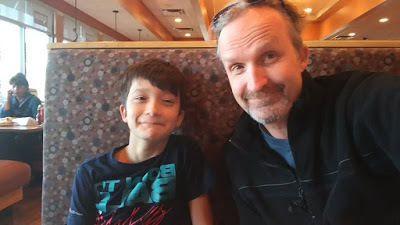
Published on November 27, 2018 00:11
August 21, 2018
It Was a Very Good Year ...
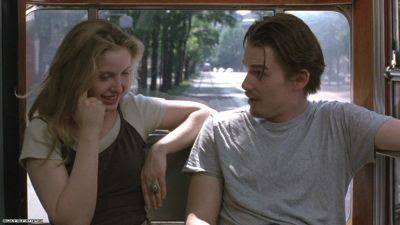
In 1995 I was working the midnight shift in a grocery store in Anchorage, Alaska. Some nights no one ever came in and on holiday weekends, when it was the most deserted, the workload was minimal. I was stuck working the entire Thanksgiving holiday that year and the night after Thanksgiving evening was like a ghost town. We had pretty much shut down all operations. The doors remained opened, but I don't recall anyone coming in.
Around 3am, I remember locking up the only open cash register and then taking a seat on a brown leather recliner in front of a TV in the video rental area and I opened a new copy of Before Sunrise, popped it into a VCR, made a cup of coffee and watched it from beginning to end.
Saying this film had an effect on me is an understatement. I remember watching Before Sunrise and feeling like it had woken me up from the fog of the last few years I was trapped in. I wasn't living like I had a dream, a direction or even felt like I had any control over my life whatsoever. Possibly every twenty-something goes through this as well. The listless and directionless period every young adult has to fight through trying to define themselves. It's probably just the question of 'how long' does that period last in most people's lives? In my own, it went on far too long, but even when I woke to it, I wasn't necessarily suddenly empowered with any new ability or gifted with the tools to fix it. I was just aware and I needed to make changes.

Before Sunrise was a beautiful movie that I found honest, endearing and what a lot of the most spontaneous moments in real life both looked and sounded like. It's a description of moments that had previously been left uncolored. There have been a few films that have done something similar, like 'Mind Walk' (1990) with Sam Waterson, Liv Ullman and John Heard. But that film, as inspired as it was, was different.
That morning, high on caffeine and sleep deprived, I quit my job and reevaluated everything I was doing and wondered deeply about everything that I wasn't. I felt compelled and I knew I had to make a change. I was taking classes at the University of Alaska, Anchorage and working towards a degree in history. The semester didn't wrap up until the second week of January, so I was stuck in place for at least the next month. I had some money, a car and would survive, but I knew I had to get as far from Alaska as possible.
I once wrote about the events that surrounded me leaving Alaska, but that was a handful of years previous and a different situation. That book has done well for itself and I'm always thankful of the letters I receive from those who read it.
Over the years when Richard Linklater added new chapters to his story which he had originally drafted with Kim Krizan, I noticed them in peripheral vision of my busy life. The continued writing of the story with every new chapter seemed to fall into the hands of Linklater, Julie Delpy and Ethan Hawke. I had read about this change in writers before I saw the second installment and I hesitated seeing it as it struck me as problematic of itself. An article in the Los Angeles Times worried that it would lose its allure. It would now become actors fashioning a vehicle to showcase themselves talking, rather than two writers crafting dialogue and scenes to go on a journey, make discoveries and put the viewer inside of that story as an omniscient to their own magic. I was afraid the second installment wouldn't work and skipped the theatrical release.
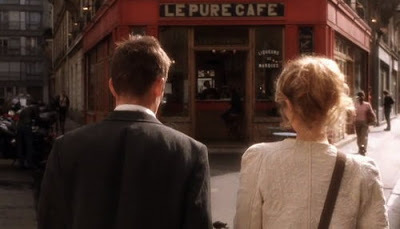
By 2004, I was living in Los Angeles, writing almost everyday and even taking bit parts in movies and hiring out to develop, edit and be a part of the creative process for other screenwriters. My life had changed. I had realized my dream even if I hadn't yet achieved it, or had a clear path to making what I did have any better. I wasn't making a living at it yet, but I wasn't buffing grocery-store floors, emptying trash or salting sidewalks at 3am anymore. I was however still living in a fog and heavily underwater with real life concerns of keeping a roof over my head, eating and maintaining my marriage with a wonderful lady who I knew needed me. Being needed was probably the newest experience for me and I was at least capable enough to recognize that. I was now a decade away from that Grocery Store in Anchorage, Alaska. If I saw a kinship in Jesse and what he was doing, it wasn't a mistake.
When I sat down a few years later to watch the second installment, Before Sunset, my wife was now pregnant with our son and we were preparing to change the course of our lives and what we were doing. It wasn't going to be just about the two of us anymore and my relationship was much further along and I was happy. I had decided to focus on novel writing and I had wrapped up a final screenplay for a friend and begun the first half of a novel that I finished earlier this year, 'Waiting for Andre.' I had also begun outlining and gathering up my old journals to write 'Greyhound.' Greyhound would be a book that would make me a lot of money, send me to conferences, book signings, author parties and all those things we dream about when becoming a 'famous writer.'
Before Sunset was interesting in the fact that it told the story of Ethan Hawke's / Jesse's success as a writer and how he had fallen in love with Julie Delpy / Celine and hadn't been able to get past her. He admits in the story that he wrote the book about them and their previous one-day encounter with the express intent of trying to find her and continue his relationship with the person he thought to be his soulmate. The whole story has a magical aspect to it, it's vibrant, moving, joyous and still has a lot of honesty all these years later. It holds up perfectly.
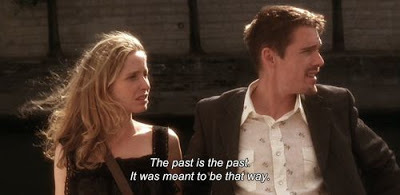
As an author who writes about his own life, I've been guilty of doing the same thing Jesse did. Looking back on the juxta-position of it, I can only laugh realizing I was making the same mistakes writing about the intimate relationship between myself and another person. The only difference is that in the land of make-believe, Jesse's book was a best-seller. My own sold nominally, made a decent amount of money and was well-received. I was gifted with more reader mail than I was reviews, but thankful for all of it. I never wrote any of my books in order to get the attention of the person in the book, nor as an attempt to get back involved with them like Jesse. Even when you're being honest about someone and portraying them over the course of 300 pages, it's unlikely they're going to appreciate how they're portrayed. Even when they're the hero. It's a hard lesson to realize because admitting that some people would prefer complete anonymity is difficult to understand, especially if you're a writer.
While most Linklater's story rings true and holds on to the same fiery energy the previous film had, it opens the door on something, at least to me, quite disturbing. In the first film, Celine jokes about being a psychopath and killing her roommate and comes across as an off-handed quip. Something people say in the course of a conversation to merely add a jolt of energy and perhaps a laugh. In the second film, it revisits this disconnectedness and the lovable and sincere Delphy has now seemingly written herself as a Holden Caulfield character, who is now dark, lost, unable to connect to anyone, unable to know love, feels like her ability to love was somehow 'magically' stolen from her by Jesse and his book and thus begins something quite different for each of them. This is dialogue straight from her mouth. Jesse believes he's embarking on the great love of his life and his dialogue reflects this. Celine has warned him she cannot love and yet accepts him into her life, and there's almost a 'you've been warned' tone to her behaviour towards him as she takes him in the last few minutes on a long-winding circuitous route upstairs to her apartment. Those last five minutes are like an omen of the film to come next.
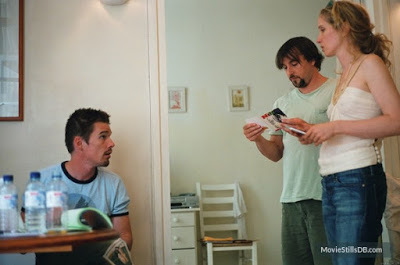
When this chapter ended, I wasn't left with the dark feelings I've highlighted here. I wasn't able to see them in the eyes I have now, nor were we gifted with the very dark third act that Linklater, Delpy and Hawke would create in 2014. I'm also not the first person to highlight those shades about Before Midnight either. Most viewers came away from the third film feeling the same way. The ending of Before Sunset ended for most with very hopeful and touching tones and everyone left the theatre or stopped their DVD's thinking that life would be what it was supposed to be for Jesse and Celine and that a third film, if it ever came, would be a family romp full of kids, problems and the juggling of life that people often have.
Years later, here we are. It's the late summer of 2018. The film has been out for four years and I've finally found time to sit down and dedicate myself to viewing it. When I saw it available on sale on VUDU streaming, I realized I should sit down and watch all three over the course of three early evenings. So, I did that. At 11pm on a Wednesday I fired up the first installment, Thursday night the second, and then Friday night the third.
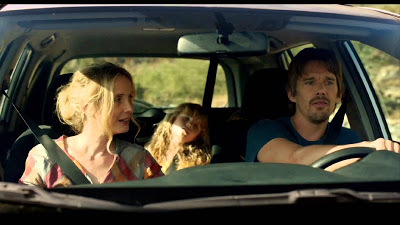
I don't need to highlight what's been going on in my life in great detail for this third part. My son is now eleven years old. He went off to camp this summer two times, once at the beginning of summer, which was the first time he'd been away from us for more than a night, which was excruciating, even though he returned home telling us that he had a wonderful time and loved camp. The second camp trip was at the end of his summer and it only seemed to bother my wife as he was out on Catalina Island with the YMCA, swimming in the ocean, jumping off the pier and supposedly having a blast. She stayed awake almost every night stuck addictively watching shark week. She said she couldn't sleep and was worried about her little boy away at camp and the possibility that something happened.
“Don't worry. If anything happened, they'll call.”
Not much happened at camp. Fox came home to report that he didn't have a good time, he got in trouble several times for not listening, talking back and was even pushed around by another kid who everyone in his cabin was fully aware of being a bigger brat than he was. The problems of life. I knew that camp was a 50/50 scenario. Not every experience is going to positive but that it would at least be a learning experience. Much like everything that happens between Celine and Jesse. It was ridiculous to think that we would drop in on them again and not see some level of dysfunction operating between the two. However, the basic premise of the tale seems to be cast aside. Two people meet up, have limited time and then try to make the most of their encounter by taking a walk to give them some space and have a chat about what's important to them. This is not the set up any longer.
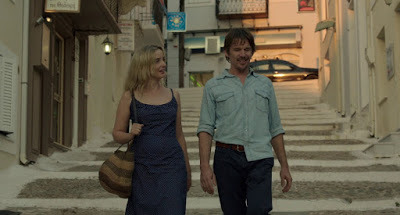
In Before Midnight, whether it was intended or not, Celine is now written as a completely deranged and psychotic emotional mess and narcissistic harassing wreck. She's unhappy still and now literally despises Jesse on every level. As participant, we don't know if it's because of her psychological personality that was just a joke in the first film and then fully developed into midlife, or if it was because of Jesse's choice of writing about them in his bestseller. There's a scene at a hotel where a young wife asks Jesse to sign a book for her as it meant everything between her and her husband. Celine rolls her eyes so hard, you wonder if it's going to break the camera lens. Then she asks Celine to sign the book and you wonder if you're about to witness a pea-soup scene from the Exorcist. Delpy's face turns almost green with disgust and you wonder if she's going to have a breakdown right at the counter.
The idea that Delpy and Hawke had an honest conversation Before Writing this third installment and showing the mess that's often entwined in real relationships is admirable. I've always assumed that both characters wrote their own parts, from all the cast interviews I've read between the three of them, that seems to be the case. This method strikes me as the best way to craft the idea that Linklater and Krizan originally begun. Wanting to show that at times relationships can tear at one partner and yet build another, often being one-sided and a display of the worst of all of us. That one person is there to carry the other like in that pop song from both of these actors late teen years is poignant, but taking it as far as they did, dismantles the storyline for no reason other than to have Julie Delpy dump all over Ethan Hawke in an endless manner all while we just wait for a reason for the spectacle. She's like a female Van Gogh here and we wonder if she's at breaking point and going to do something rash. I wanted to ask Delpy why this kind of hatred was necessary? It was cynical at best and troubling and sad at most. She becomes Holden Caulfield personified and even seems to venture into Mark David Chapman territory where she just wants to assassinate her now negative obsession that she's in orbit of. Everything is a reason to hate him and Jesse keeps trying to find some common ground. Almost foolishly. But then you realize ... it's just one day. One day in a very long relationship.
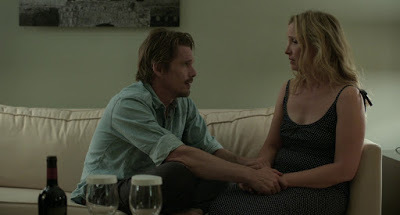
While it's easy to point and say too many midlife relationships are like this, the opposite is also true and some people's mid-life relationships are much more fulfilling, honest and less combative than portrayed here. The one variable that seems to get people worked up about Before Midnight is the nasty, argumentative and completely disconnected nature between the couple that consumed the third film.
Linklater stated that these films are a Rorschach test for your own relationship, but I think that sounds almost like a cop-out in not recognizing the problems the third film had, whether intentionally or not. However, all creators are cursed with this spiritual fortitude in regards to their work as it has to stand on its own and live its own life separate from the creators. It's now just as much ours as it was theirs when they made it, flaws, scars and all.
When you read a lot of the commentary on this third film, whether it's professional or just from the general public, everyone remarks about it creating a trilogy and how the arc wraps up the story, even the creators have stated as much. I personally didn't feel like that at all. I've actually been feeling like these movies are closer to seasons. Spring, Summer, Fall and Winter. Lives are actually lived like that more than a three-act melodrama. Most people usually don't sit around long enough for the fourth act however. In Kabuki theatre, sure. Most Western mystery traditions and storyforms? No.
I don't know if some viewers would go along for the journey again after seeing what happened in Before Midnight, but maybe a decade passing will soften that blow as well as people's feeling's about Celine's internal madness. Anything is possible. Maybe these films will touch a nerve on yet one more generation and find a way to enshrine them in their lives, too.
The next film could possibly be the last, rounding out the tale where we now deal with real loss, and not just the superficial loss of self that we see both Jesse and Celine battling over in the this third act. It would be drastic, but Jesse dealing with the loss of Celine would be one direction. Celine being shown in glimpses and memories, trapped in her own full-blown rejected Van Gogh Madness, Attacking her family, herself and Jesse still. Where she ends up taking her life in a fit of emotional desperation. I can almost hear Frank Sinatra singing 'It Was a Very Good Year' in the background setting the tempo and placing our characters in somewhere so far unseen, but expected. Maybe Alaska.
Rich Linklater might interject here and say 'The movie opens with a close up on Jesse. His hair now as gray as puffy rain clouds over farmland. He's reading the lyrics of 'It Was a Very Good Year' aloud in a book store with dramatic effect as it's the opening of his new novel. That's all I got so far, what do you two think?” Rich sits unblinking for a response while Hawke and Delpy pensively look on evaluating, not knowing what to say, just as they likely did with the previous two films.
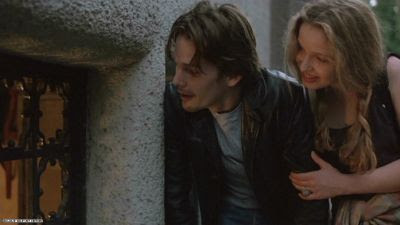
It could also go the other way where Celine is now mourning the loss of Jesse after something tragic and she has to reevaluate her relationship with him over the years. Feel the loss of him as a husband and father, the good and the bad. Both versions would be equally hard to take, but equally compelling. I think at some point this conceived notion of mine is likely a film that will come to pass and hopefully we'll yet see these two and their relationship once again. My wife asked what's so special about these films, and the answer is an easy one, at least to me. These examples are touchstones for others. A slice of reality to show you you're not alone in whatever it is you're going through. Good or bad. Especially the bad. Jesse's overwhelming push at the end, and Dad example was what most good husbands and spouses both know. Just make it till tomorrow and whatever it is won't seem so bad or feel so destructive. Get through it.
Even with the rough, unpaved nature of it. Midnight stands just as beautifully as the others, even though, it's arguably the hardest pill to swallow.
***
Published on August 21, 2018 22:59
August 9, 2018
Agents ...
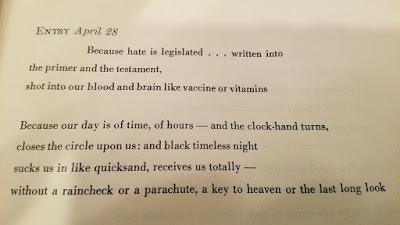
Feeling trepidatious and insecure to boot as I prepare to send my Query Letter I've concocted in hopes to find a new agent. The moment I hit send on these I'm going to fear my email from here forward. I've narrowed down some agents that I think are appropriate for what I write, but if they all pass it's going to feel like a baptism by fire I'm sure. I have two novels ready, but I'm only going to push one at a time.#SleepLikeaBabyTonight
#Untitled1997Book
Published on August 09, 2018 22:26
June 30, 2018
Summer Reading Marketing Push / Book Sale ...

If you've ever wanted to buy any of my books, but needed Goodreads, Amazon or any other platform to pitch it to you for some reason of safety or comfort, here ya go! The entire month of July! .99 cents! My publisher is still working miracles for me.For the record this is the first time they've pushed my book this hard since its release in 2010. During the first month's launch, they campaigned over Goodreads and it was highly successful. While they've heavily marketed the book over many platforms through the years, this time looks a little different as it's better targeted, carrying greater positive reviews and so forth.
Yes, I know what some of you are already thinking, but concernns aside ...To quote Dr. Malcolm: "Life always ... RUUUUUNNNN!!!"
Published on June 30, 2018 14:26
May 2, 2018
Great Ideas Which Need Pursued ...
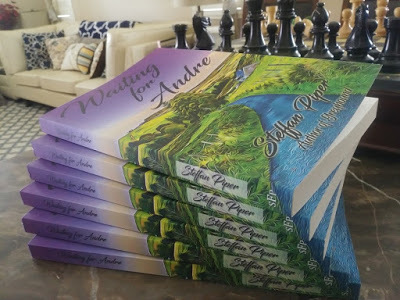
While it took 9 whole days to get my author copies I ordered from Amazon, and it felt like forever, they finally showed up at my house. Somehow they got beat up in the mail, but having seemingly traveled by horseback across the vasty fields of France to get to me, I shouldn't be surprised.
I had to go back and completely rework the Paperback version I released just last month. I was unhappy with the original and felt the layout did not do the material justice. I made a few improvements to the cover for readability and adjusted the spine, but I think this is the best version to be had at this point. I'm still perplexed by the "Fuzzy Cover Feel" these new paperbacks all seem to have, but they do have an electrical charge effect when holding them. They feel quality, whatever that might mean. Even when I order paperbacks from other Publishers, they have that same velvety or felt-like feel. Newer digital printers must've made this happen with uber saturating the card stock, but whatever, I'm okay with it.
When I decided to have Waiting for Andre to come out like this, I knew that it would never be a book that would become a bestseller, or make waves in the writing world. It's a niche story, for a niche audience, which is ever shrinking and more of a novelty now more than anything serious. People may mention it in passing years from now, but that's about it. That said, it's better released like this rather than not released at all. Getting someone to agent and publish Literary Fiction that is Period Speculative-Biography is too much to handle anymore.
Most of the time I worked on the book as a side project while writing my other novels, and while I was underwater with the research behind this book, I loved working on it every moment. The story I imagined ended up in the book and the story in the book is likely one that would've been in Beckett's biography had there been a bit more honesty about his very cluttered life. I say that not because what I wrote actually happened, but because it very likely did happen just as I wrote it. Sounds absurd, but that's probably the point. I'm also not saying that his biographers weren't honest either. I just don't think anyone cared to color in the details of his already well-known reputation. Back then, they gave you a pass on the details of your behaviour.
I had once imagined being interviewed by NPR and Terry Gross about the book, but I think the allure of the story has passed. When I first wrote this in 2005, it was a strong, original idea. As the years clicked away and it sat in my desk drawer, my feelings changed and so did the world. Especially where it counted regarding what was considered marketable or just mildly interesting enough to publish and publicize.
Theatre has changed a lot since Beckett's age when his biggest fear was seeing his owrk being dumbed-down and turned into pap for monied mouthbreathers. Post-Mortem ... queue up Edward Albee. He spent years monitoring Beckett's works and every play that would make the stage. If it wasn't to liking, they would sue the production company or send a 'cease-and-desist'. School kids got the same heavy-handed treatment larger production companies got. No mercy. Shouts of 'Sweep the leg!' ring out through the crowd. I would be lying if my fears regarding Albee also weren't a part of why I didn't move forward with this book until after his death. Everything I've read about Beckett tells me that he would've liked it. Albee ... not so much. Beckett was definitely the kind of person you would find in this story.
Now the theatre is a very different monster. Projects like Hair, Hamilton and even Spongebob have changed Broadway in ways Beckett would've never imagined. Absurdism? Yeah, the world's absurd, but not in the 'classic' sense I'm guessing. The theatre has been overtaken it seems by an era of romantic nostalgism, like with Jersey Boys, Grease, Momma Mia, Wicked and a litany of Baby Boomer Trope Du Jour.
Since 2005 when I wrote most of this, and even 2012, when I finished it the first time, there's been a BBC TV episode which was originally meant to be a film. Also, someone did a two-man theatre production about this idea two years ago. So, in my opinion, the wide appeal interest of it -- has been spent.
Earlier this year I spent a couple of months doing a complete and final rewrite of the material. One of the main things the reader can take away is that Samuel Beckett is the protagonist of this story and it's told in the first person. The book is just as much about him as it is of Andre. Why did I do that? Well, because I believed that Beckett was so far removed from modern culture, that most readers wouldn't grasp the kind of person he was by going in with the usual third person, he-said-she-said. Then, after I made that decision, I then double-downed and wrote the book in the voice and style of Beckett. This wasn't easy and honestly made the book a little heavy in places and maybe a bit unreadable in others, especially for the modern reader. I understand why my old publisher passed on the material, even though it was a difficult pill to swallow.
Has Beckett become out of touch? Is that what this author is suggesting? No. Not at all. I'm saying that books today are written very differently than they used to be. Some say that's a good thing. The syntax, grammar and punctuation have changed dramatically in almost 90 years. Yes, that's how much time has passed. His novel Murphy was originally published in 1938. If I had gone with the original draft version, my audience for this material would've been even smaller than it already is. Waiting for Andre would've been Relegated to academics and theatre lovers. The goal was to tell a convincing story about the positive relationship between these two people, set in the cultural zeitgeist of the time and have a clear point. Andre had as much to share and give to Sam as is true in the opposite. Perhaps more, being who, or how, Beckett was.
The lesson for me to take away, as well the reader, is simple. If you have a good idea, you're probably best advised to strike while the iron is hot. There's a lot of truth in old sayings. This one's no different.
I have 5 signed copies I'm going to give away. If you've read down this far, and would like a signed copy, comment below and I'll arrange it to be sent your way.
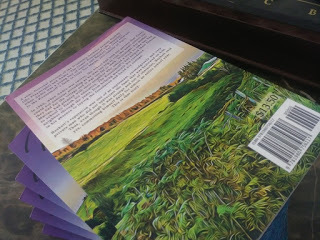
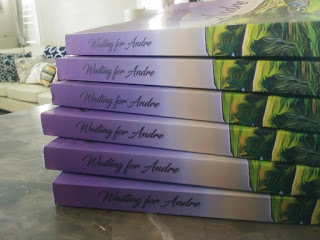
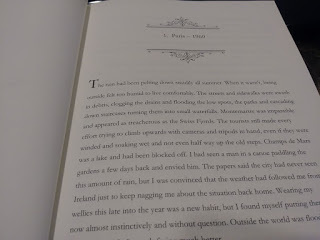
Published on May 02, 2018 18:15
Author Copies ... Great Ideas Which Need Pursued ...

While it took 9 whole days to get my author copies I ordered from Amazon, and it felt like forever, they finally showed up at my house. Somehow they got beat up in the mail, but having seemingly traveled by horseback across the vasty fields of France to get to me, I shouldn't be surprised.I had to go back and completely rework the Paperback version I released just last month. I was unhappy with the original and felt the layout did not do the material justice. I made a few improvements to the cover for readability and adjusted the spine, but I think this is the best version to be had at this point. I'm still perplexed by the "Fuzzy Cover Feel" these new paperbacks all seem to have, but they do have an electrical charge effect when holding them. They feel quality, whatever that might mean. Even when I order paperbacks from other Publishers, they have that same velvety or felt-like feel. Newer digital printers must've made this happen with uber saturating the card stock, but whatever, I'm okay with it.When I decided to have Waiting for Andre to come out like this, I knew that it would never be a book that would become a bestseller, or make waves in the writing world. It's a niche story, for a niche audience, which is ever shrinking and more of a novelty now more than anything serious. People may mention it in passing years from now, but that's about it. That said, it's better released like this rather than not released at all. Getting someone to agent and publish Literary Fiction that is Period Speculative-Biography is too much to handle anymore. Most of the time I worked on the book as a side project while writing my other novels, although I loved working on it every moment. The story I imagined ended up in the book and the story in the book is likely one that would've been in Beckett's biography had there been a bit more honesty about his very cluttered life. I say that not because what I wrote actually happened, but because it very likely did happen just as I wrote it. Sounds absurd, but that's probably the point. I'm also not saying that his biographers weren't honest either. I had once imagined being interviewed by NPR and Terry Gross about the book, but I think the allure of the story has passed. When I first wrote this in 2005, it was a strong, original idea. As the years clicked away and it sat in my desk drawer, my feelings changed and so did the world. Especially where it counted regarding what was considered marketable or just mildly interesting enough to publish and publicize. Theatre has changed a lot since Beckett's age when his biggest fear was being dumbed-down and turned into pap for monied mouthbreathers. Post-Mortem ... queue up Edward Albee. He spent years monitoring Beckett's works and every play that would make the stage. If it wasn't to liking, they would sue the production company or send a 'cease-and-desist'. I would be lying if my fears regarding Albee also weren't a part of why I didn't move forward with this book until after his death. Everything I've read about Beckett tells me that he would've liked it. Albee ... not so much. Beckett was definitely the kind of person you will find in this story.Now the theatre is a very different monster. Projects like Hair, Hamilton and even Spongebob have changed Broadway in ways Beckett would've never imagined. Absurdism? Yeah, the world's absurd, but not in the 'classic' sense I'm guessing. The theatre has been overtaken it seems by an era of romantic nostalgism, like with Jersey Boys, Grease, Momma Mia, and a litany of Baby Boomer Trope Du Jours.Since 2005 when I wrote most of this, and even 2012, where I finished it the first time, there's been a BBC TV episode which was originally meant to be a film. Also, someone did a two-man theatre production about this idea two years ago. So, in my opinion, the wide appeal interest of it -- has been spent. Earlier this year I spent a couple of months doing a complete and final rewrite of the material. One of the main things the reader can take away is that Samuel Beckett is the protagonist of this story and it's told in the first person. The book is just as much about him as it is of Andre. Why did I do that? Well, because I believed that Beckett was so far removed from the modern culture scene that most readers wouldn't grasp the kind of person he was by going in with the usual third person, he-said-she-said. Then, after I made that decision, I then double-downed and wrote the book in the voice and style of Beckett. Which wasn't easy and honestly made the book a little heavy in places and maybe a bit unreadable in others, specially for the modern reader. I understand why my old publisher passed on the material, even though it was a difficult pill to swallow.Has Beckett become out of touch? Is that what this author is suggesting? No. Not at all. I'm saying that books today, with syntax, grammar and punctuation have changed dramatically in almost 90 years. Yes, that's how much time has passed. His novel Murphy was originally published in 1938. If I had gone with the original draft version, my audience for this material would've been even smaller than it already is. Relegated to academics and theatre lovers. The goal was to tell a convincing story about the positive relationship between these two people, set int he cultural zeitgeist of the time and have a point about it. Andre had as much to share and give to Sam as is true in the opposite. Perhaps more, being who, or how, Beckett was.The lesson for me to take away, as well the reader, is simple. If you have a good idea, you're probably best advised to strike while the iron is hot. There's a lot of truth in old sayings. This one's no different.I have 5 signed copies I'm going to give away. If you've read down this far, and would like a signed copy, comment below and I'll arrange it to be sent your way.



Published on May 02, 2018 18:15



